How to identify scams like "OneDrive - You Received Some Files"
Phishing/ScamAlso Known As: OneDrive - You Received Some Files phishing email
Get free scan and check if your device is infected.
Remove it nowTo use full-featured product, you have to purchase a license for Combo Cleaner. Seven days free trial available. Combo Cleaner is owned and operated by RCS LT, the parent company of PCRisk.com.
What is "OneDrive - You Received Some Files"?
During our examination of this email, we discovered it to be a fraudulent endeavor aimed at soliciting personal information from recipients. Disguised as a notification from Microsoft regarding files received via OneDrive, it includes a link to a deceptive webpage. Such emails are commonly referred to as phishing emails.
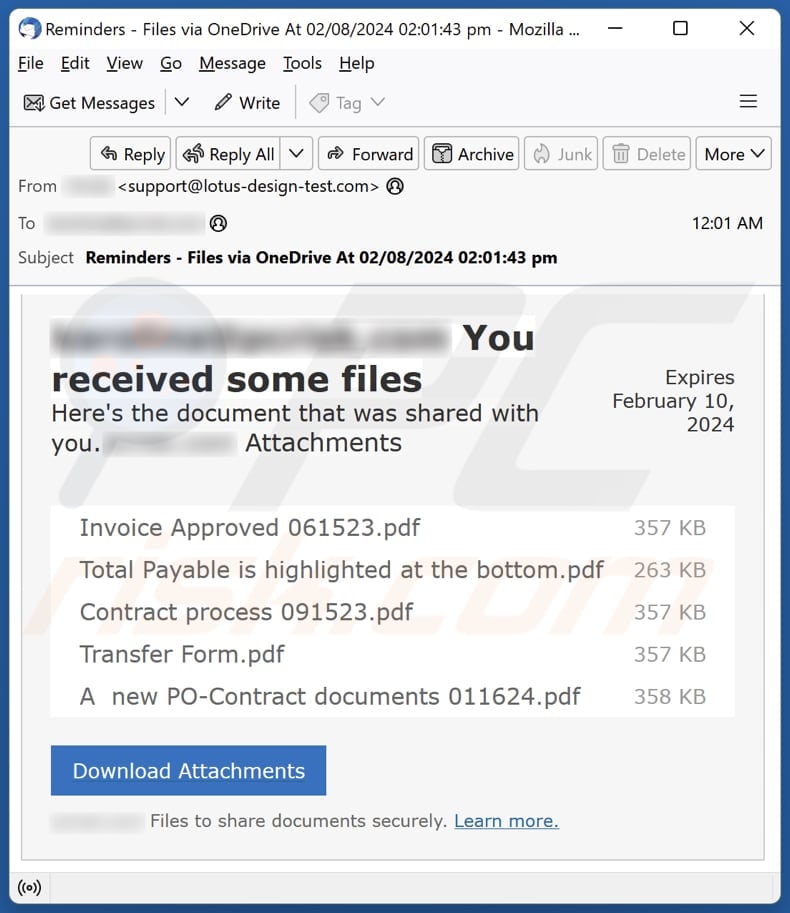
More about the "OneDrive - You Received Some Files" scam email
The subject line of the email reads "Reminders - Files via OneDrive" the body of the email includes a message indicating that the recipient has received some files and provides a list of attachments, each with a file name and size indicated. The email emphasizes an expiration date of February 10, 2024, presumably to create a sense of urgency.
Additionally, there is a call-to-action button prompting the recipient to "Download Attachments". After clicking the button to "download attachments", the recipient is redirected to a counterfeit OneDrive webpage. This page prompts the visitor to verify their identity by entering their email account login credentials in order to access the purported PDF files.
However, this request for login information is part of a phishing scam designed to deceive users into unwittingly providing their sensitive personal data to malicious actors. Once scammers obtain stolen email account login credentials through phishing or other illicit means, they can exploit them for various nefarious purposes.
One common tactic is to access the victim's email inbox to gather additional sensitive information, such as financial data, personal correspondence, or login credentials for other online accounts. Furthermore, compromised email accounts can be leveraged to facilitate spam campaigns or distribute malware to a wider audience.
Scammers may also exploit stolen email account login credentials to access and compromise other accounts linked to the same email address or using identical login credentials. This could include social media accounts, online banking portals, e-commerce platforms, etc.
Recipients should immediately delete the suspicious email and refrain from clicking any links or downloading any attachments. Additionally, they should report the phishing attempt to the appropriate authorities or the legitimate organization being impersonated to help prevent others from falling victim to similar scams.
| Name | OneDrive - You Received Some Files Email Scam |
| Threat Type | Phishing, Scam, Social Engineering, Fraud |
| Fake Claim | Recipients received files via OneDrive |
| Disguise | Notification from OneDrive (Microsoft) |
| Symptoms | Unauthorized online purchases, changed online account passwords, identity theft, illegal access of the computer. |
| Distribution methods | Deceptive emails, rogue online pop-up ads, search engine poisoning techniques, misspelled domains. |
| Damage | Loss of sensitive private information, monetary loss, identity theft. |
| Malware Removal (Windows) |
To eliminate possible malware infections, scan your computer with legitimate antivirus software. Our security researchers recommend using Combo Cleaner. Download Combo CleanerTo use full-featured product, you have to purchase a license for Combo Cleaner. 7 days free trial available. Combo Cleaner is owned and operated by RCS LT, the parent company of PCRisk.com. |
Similar scam emails in general
Phishing emails usually include deceptive sender addresses or domains that mimic legitimate organizations, urgent or threatening language to create a sense of urgency, requests for sensitive information like passwords or financial details, and links or attachments leading to malicious websites or malware.
Additionally, phishing emails often contain spelling or grammatical errors and may lack personalization, appearing generic and unsolicited. Examples of phishing campaigns delivered via email are "Price And Stock Availability", "Protected Message", and "DHL Global Express Shipping".
How do spam campaigns infect computers?
Emails serve as a common entry point for malware to infiltrate computers. Cybercriminals behind malicious emails aim to trick recipients into clicking harmful links or opening infected attachments. It is worth noting that not all files immediately infect computers upon opening. Some require additional user actions (e.g., enabling macros commands in MS Office documents) to activate the malware.
Malicious files distributed via email come in various formats, including executable files (.exe), script files (.js or .vbs), document files (.docx or .pdf), compressed files (.zip or .rar), and shortcut files (.lnk).
These files may contain hidden malicious code or payloads that, once triggered, can infect the user's system with different types of malware, ranging from viruses to ransomware.
How to avoid installation of malware?
Be cautious with email attachments and links, particularly if they are from unknown senders or seem irrelevant. Download software and files exclusively from official sources or trusted app stores, avoiding pirated software, cracking tools, key generators, etc.
Stay vigilant against suspicious pop-ups, ads, or download buttons on questionable websites. Keep your operating system and applications up to date to patch security vulnerabilities, and utilize reliable antivirus or anti-malware software, ensuring it is regularly updated to detect and remove potential threats.
If you have already opened malicious attachments, we recommend running a scan with Combo Cleaner Antivirus for Windows to automatically eliminate infiltrated malware.
Text presented in the "OneDrive - You Received Some Files" email letter:
Subject: Reminders - Files via OneDrive At 02/08/2024 02:01:43 pm
******** You received some files
Here's the document that was shared with you.******** AttachmentsExpires February 10, 2024
Invoice Approved 061523.pdf 357 KB
Total Payable is highlighted at the bottom.pdf 263 KB
Contract process 091523.pdf 357 KB
Transfer Form.pdf 357 KB
- new PO-Contract documents 011624.pdf 358 KB
Download Attachments
******** Files to share documents securely. Learn more.
Phishing website (fake OneDrive site) used in this scam:
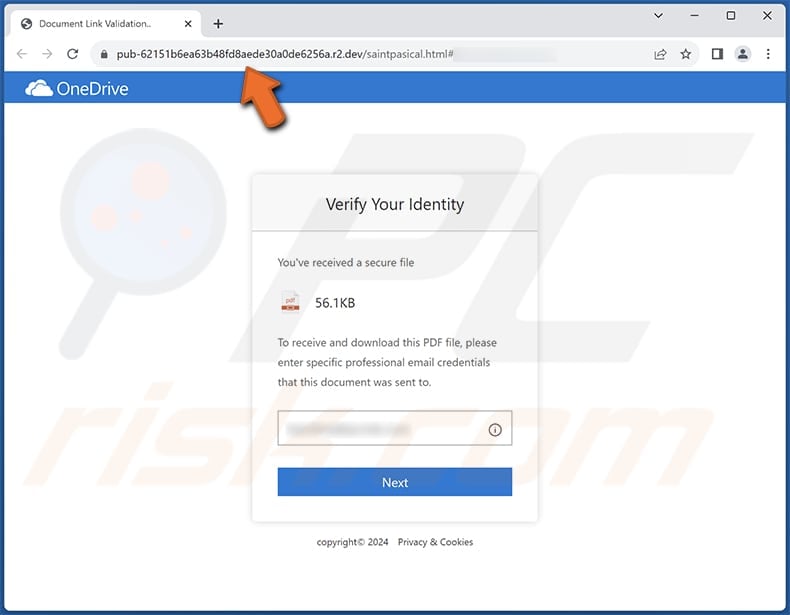
Second variant of the "OneDrive - You Received Some Files" scam email:
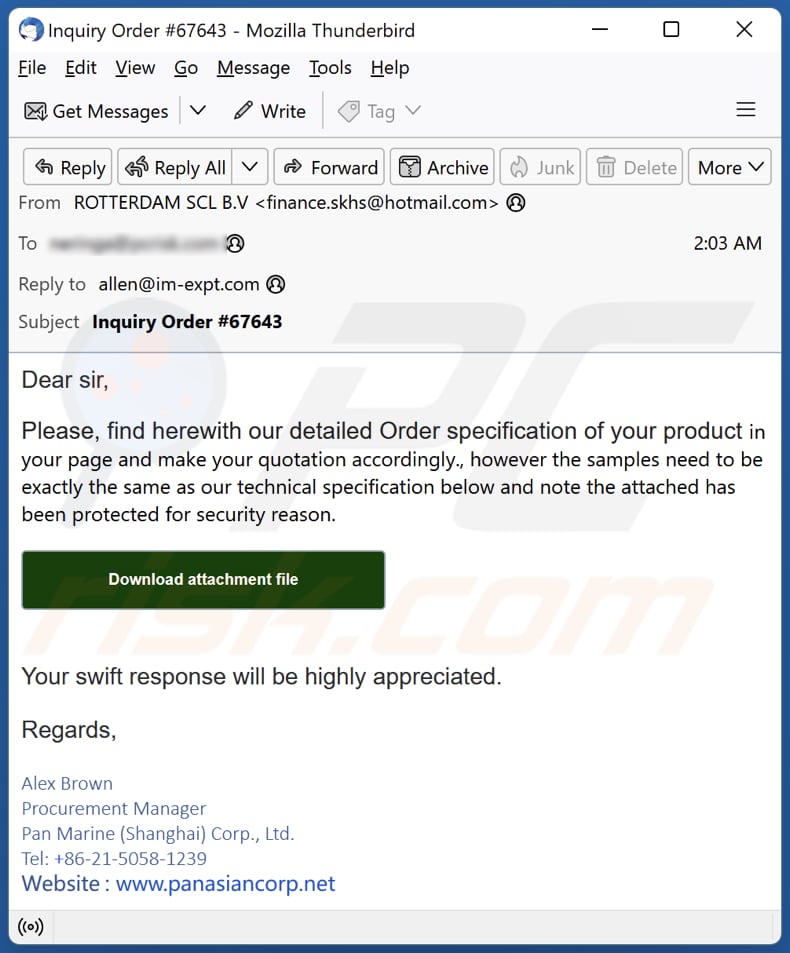
Text in this email:
Subject: Inquiry Order #67643
Dear sir,Please, find herewith our detailed Order specification of your product in your page and make your quotation accordingly., however the samples need to be exactly the same as our technical specification below and note the attached has been protected for security reason.
Your swift response will be highly appreciated.Regards,
Alex Brown
Procurement Manager
Pan Marine (Shanghai) Corp., Ltd.
Tel: +86-21-5058-1239
Website : www.panasiancorp[.]net
Phishing page utilized in this variant:
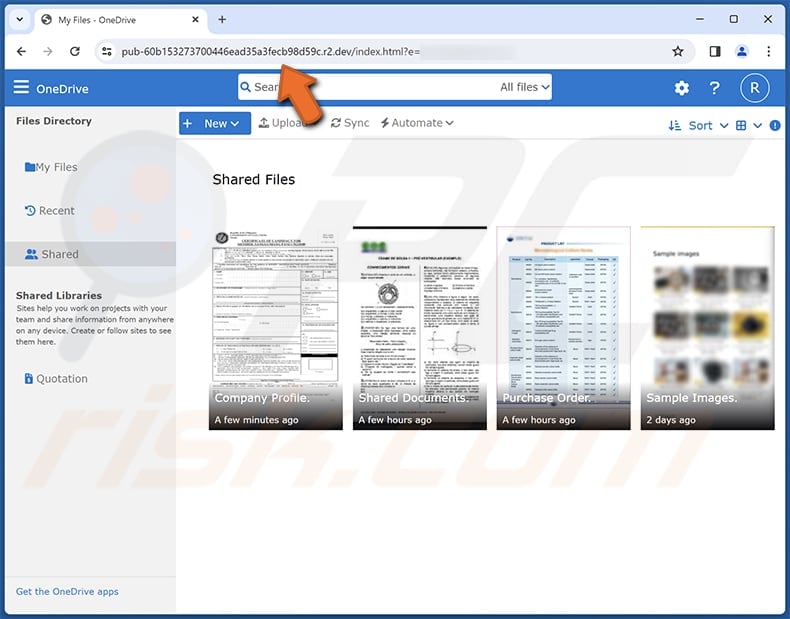
Third variant of the "OneDrive - You Received Some Files" scam email:
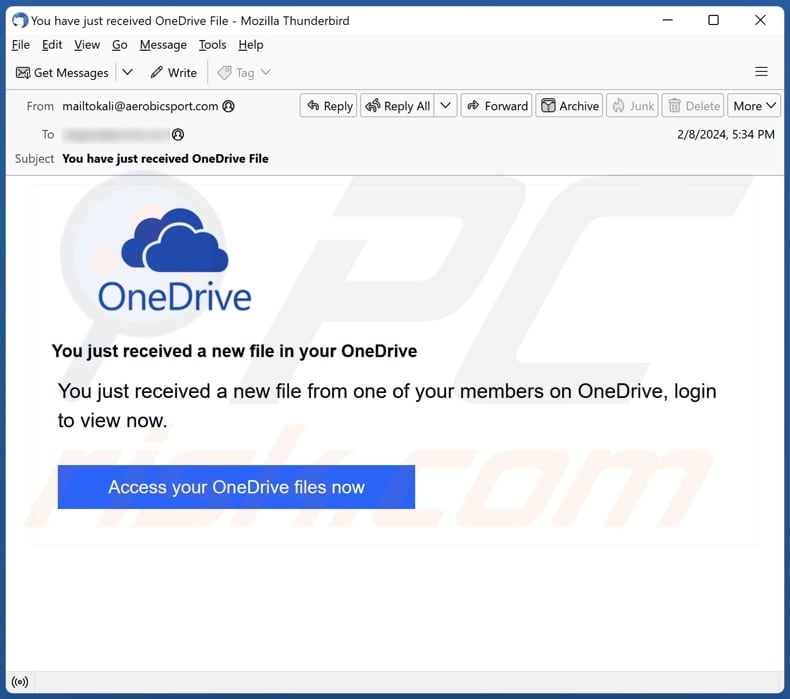
Text in this email:
Subject: You have just received OneDrive File
OneDrive
You just received a new file in your OneDrive
You just received a new file from one of your members on OneDrive, login to view now.
Access your OneDrive files now
Phishing page provided in this variant:
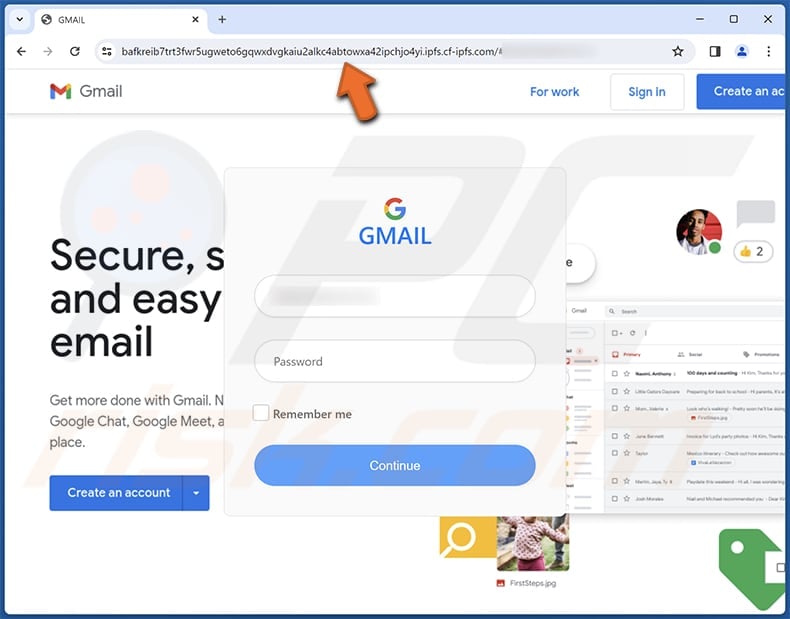
Instant automatic malware removal:
Manual threat removal might be a lengthy and complicated process that requires advanced IT skills. Combo Cleaner is a professional automatic malware removal tool that is recommended to get rid of malware. Download it by clicking the button below:
DOWNLOAD Combo CleanerBy downloading any software listed on this website you agree to our Privacy Policy and Terms of Use. To use full-featured product, you have to purchase a license for Combo Cleaner. 7 days free trial available. Combo Cleaner is owned and operated by RCS LT, the parent company of PCRisk.com.
Quick menu:
- What is OneDrive - You Received Some Files phishing email?
- Types of malicious emails.
- How to spot a malicious email?
- What to do if you fell for an email scam?
Types of malicious emails:
![]() Phishing Emails
Phishing Emails
Most commonly, cybercriminals use deceptive emails to trick Internet users into giving away their sensitive private information, for example, login information for various online services, email accounts, or online banking information.
Such attacks are called phishing. In a phishing attack, cybercriminals usually send an email message with some popular service logo (for example, Microsoft, DHL, Amazon, Netflix), create urgency (wrong shipping address, expired password, etc.), and place a link which they hope their potential victims will click on.
After clicking the link presented in such email message, victims are redirected to a fake website that looks identical or extremely similar to the original one. Victims are then asked to enter their password, credit card details, or some other information that gets stolen by cybercriminals.
![]() Emails with Malicious Attachments
Emails with Malicious Attachments
Another popular attack vector is email spam with malicious attachments that infect users' computers with malware. Malicious attachments usually carry trojans that are capable of stealing passwords, banking information, and other sensitive information.
In such attacks, cybercriminals' main goal is to trick their potential victims into opening an infected email attachment. To achieve this goal, email messages usually talk about recently received invoices, faxes, or voice messages.
If a potential victim falls for the lure and opens the attachment, their computers get infected, and cybercriminals can collect a lot of sensitive information.
While it's a more complicated method to steal personal information (spam filters and antivirus programs usually detect such attempts), if successful, cybercriminals can get a much wider array of data and can collect information for a long period of time.
![]() Sextortion Emails
Sextortion Emails
This is a type of phishing. In this case, users receive an email claiming that a cybercriminal could access the webcam of the potential victim and has a video recording of one's masturbation.
To get rid of the video, victims are asked to pay a ransom (usually using Bitcoin or another cryptocurrency). Nevertheless, all of these claims are false - users who receive such emails should ignore and delete them.
How to spot a malicious email?
While cyber criminals try to make their lure emails look trustworthy, here are some things that you should look for when trying to spot a phishing email:
- Check the sender's ("from") email address: Hover your mouse over the "from" address and check if it's legitimate. For example, if you received an email from Microsoft, be sure to check if the email address is @microsoft.com and not something suspicious like @m1crosoft.com, @microsfot.com, @account-security-noreply.com, etc.
- Check for generic greetings: If the greeting in the email is "Dear user", "Dear @youremail.com", "Dear valued customer", this should raise suspiciousness. Most commonly, companies call you by your name. Lack of this information could signal a phishing attempt.
- Check the links in the email: Hover your mouse over the link presented in the email, if the link that appears seems suspicious, don't click it. For example, if you received an email from Microsoft and the link in the email shows that it will go to firebasestorage.googleapis.com/v0... you shouldn't trust it. It's best not to click any links in the emails but to visit the company website that sent you the email in the first place.
- Don't blindly trust email attachments: Most commonly, legitimate companies will ask you to log in to their website and to view any documents there; if you received an email with an attachment, it's a good idea to scan it with an antivirus application. Infected email attachments are a common attack vector used by cybercriminals.
To minimise the risk of opening phishing and malicious emails we recommend using Combo Cleaner Antivirus for Windows.
Example of a spam email:

What to do if you fell for an email scam?
- If you clicked on a link in a phishing email and entered your password - be sure to change your password as soon as possible. Usually, cybercriminals collect stolen credentials and then sell them to other groups that use them for malicious purposes. If you change your password in a timely manner, there's a chance that criminals won't have enough time to do any damage.
- If you entered your credit card information - contact your bank as soon as possible and explain the situation. There's a good chance that you will need to cancel your compromised credit card and get a new one.
- If you see any signs of identity theft - you should immediately contact the Federal Trade Commission. This institution will collect information about your situation and create a personal recovery plan.
- If you opened a malicious attachment - your computer is probably infected, you should scan it with a reputable antivirus application. For this purpose, we recommend using Combo Cleaner Antivirus for Windows.
- Help other Internet users - report phishing emails to Anti-Phishing Working Group, FBI’s Internet Crime Complaint Center, National Fraud Information Center and U.S. Department of Justice.
Frequently Asked Questions (FAQ)
Why did I receive this email?
Fraudsters send identical emails to multiple (usually a large number) recipients, hoping that some will fall for the scam. Their emails are not personal (they do not include names, surnames, or similar details).
I have provided my personal information when tricked by this email, what should I do?
Promptly update the passwords for the impacted accounts and activate two-factor authentication wherever available. Also, watch your accounts closely for any unusual behavior and consider notifying the relevant service providers about the potential security breach.
I have downloaded and opened a malicious file attached to an email, is my computer infected?
Running an executable file carries a substantial risk of infection, whereas document files such as .pdf or .doc typically pose a lower threat. The level of risk varies depending on the file type.
I have read the email but did not open the attachment, is my computer infected?
Merely opening an email does not pose a risk on its own. However, engaging with links or opening attached files can potentially expose computers to malware infections.
Will Combo Cleaner remove malware infections that were present in email attachment?
Combo Cleaner is effective at identifying and removing the majority of known malware infections. Nonetheless, it is crucial to recognize that sophisticated malware can often conceal itself deeply within the system. Therefore, performing a comprehensive system scan is imperative to eradicate hidden threats.
Share:

Tomas Meskauskas
Expert security researcher, professional malware analyst
I am passionate about computer security and technology. I have an experience of over 10 years working in various companies related to computer technical issue solving and Internet security. I have been working as an author and editor for pcrisk.com since 2010. Follow me on Twitter and LinkedIn to stay informed about the latest online security threats.
PCrisk security portal is brought by a company RCS LT.
Joined forces of security researchers help educate computer users about the latest online security threats. More information about the company RCS LT.
Our malware removal guides are free. However, if you want to support us you can send us a donation.
DonatePCrisk security portal is brought by a company RCS LT.
Joined forces of security researchers help educate computer users about the latest online security threats. More information about the company RCS LT.
Our malware removal guides are free. However, if you want to support us you can send us a donation.
Donate
▼ Show Discussion